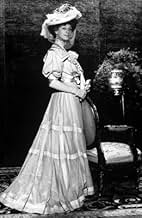While recovering in Venice, sickly composer Gustav von Aschenbach becomes dangerously fixated with teenager Tadzio.While recovering in Venice, sickly composer Gustav von Aschenbach becomes dangerously fixated with teenager Tadzio.While recovering in Venice, sickly composer Gustav von Aschenbach becomes dangerously fixated with teenager Tadzio.
- Nominated for 1 Oscar
- 18 wins & 7 nominations total
Björn Andrésen
- Tadzio
- (as Björn Andresen)
Eva Axén
- Tadzio's Oldest Sister
- (uncredited)
Marcello Bonini Olas
- Nobleman at Hotel Party
- (uncredited)
- Director
- Writers
- All cast & crew
- Production, box office & more at IMDbPro
Storyline
Did you know
- TriviaThe boy on whom Tadzio was based, Wladyslaw Gerard Jan Nepomuk Marya Moes, was only 10 in May 1911.
- GoofsTV aerials are clearly visible on Venetian rooftops in one scene.
- Alternate versionsThe 'pan and scan' VHS released in 1993 by Warner Home Video has an extended overture of music over black - and after the opening titles goes to a hard cut, mid-shot, of Bogarde sitting on the deck of a ship (totally omitting the opening establishing shot of the the ship at sea in long shot - and much of the subsequent establishing shot of Bogarde.)
- ConnectionsFeatured in Temporada de Caça (1988)
- SoundtracksSehr Langsam Misterioso from Symphony No.3
Written by Gustav Mahler
Performed by Orchestra dell'Accademia Nazionale di Santa Cecilia (as The Orchestra of the Academy of Saint Cecilia) and Lucretia West (alto)
Conducted by Franco Mannino
Featured review
Set in Venice mainly on the Lido, Visconti's "Death in Venice" is a triumph of filmmaking combining the excellence of Dirk Bogarde's characterisation and expert photography of the resort area in all its various daily moods. For those who love Venice, this is a film to cherish.
Mahler's music frequently heard throughout the film heightens the drama. The mood it creates is not always happy. But then what else would you expect with a title like that?
There is not a lot of dialogue in the film. Rather sparse in fact. It's mainly background noises and chatter and laughter among the hotel guests. The intriguing part is to interpret the exchange of glances between Gustav von Aschenbach a composer of some renown and a slim teenage youth Tadzio who see each other from time to time across the tables of the hotel dining room, on the beach and at odd unexpected places around Venice. They seem to acknowledge each other's presence shyly at first with little more than the suggestion of a smile but later with a strong and riveting and urgent gaze.
Each viewer will have his own interpretation. The composer has lost a child of his own. Is this behaviour an expression of yearning for the child he loved? Is it perhaps a sexual attraction towards this fragile young man with his dazed somewhat girlish stare? Could he be discovering some new inspiration for a yet unwritten musical masterpiece? Who knows?
From beginning to end this film captures the true spirit of 19th Century Venice. The elegance of the ladies, the deck chairs on the sand, the children frolicking in their neck-to-knee bathing costumes, the glow of sunsets and a general feeling of satisfaction with the world. While some may think the pace is rather slow at times, the film has an overall gentle quality, but with a simmering indecision between two repressed human beings. Be prepared for a sad and beautiful ending.
Mahler's music frequently heard throughout the film heightens the drama. The mood it creates is not always happy. But then what else would you expect with a title like that?
There is not a lot of dialogue in the film. Rather sparse in fact. It's mainly background noises and chatter and laughter among the hotel guests. The intriguing part is to interpret the exchange of glances between Gustav von Aschenbach a composer of some renown and a slim teenage youth Tadzio who see each other from time to time across the tables of the hotel dining room, on the beach and at odd unexpected places around Venice. They seem to acknowledge each other's presence shyly at first with little more than the suggestion of a smile but later with a strong and riveting and urgent gaze.
Each viewer will have his own interpretation. The composer has lost a child of his own. Is this behaviour an expression of yearning for the child he loved? Is it perhaps a sexual attraction towards this fragile young man with his dazed somewhat girlish stare? Could he be discovering some new inspiration for a yet unwritten musical masterpiece? Who knows?
From beginning to end this film captures the true spirit of 19th Century Venice. The elegance of the ladies, the deck chairs on the sand, the children frolicking in their neck-to-knee bathing costumes, the glow of sunsets and a general feeling of satisfaction with the world. While some may think the pace is rather slow at times, the film has an overall gentle quality, but with a simmering indecision between two repressed human beings. Be prepared for a sad and beautiful ending.
- raymond-15
- May 17, 2004
- Permalink
- How long is Death in Venice?Powered by Alexa
Details
- Release date
- Countries of origin
- Languages
- Also known as
- Smrt u Veneciji
- Filming locations
- Production companies
- See more company credits at IMDbPro
Box office
- Gross worldwide
- $5,597
Contribute to this page
Suggest an edit or add missing content


































